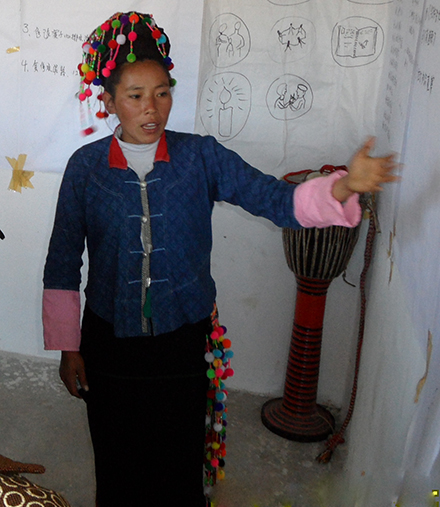
Before their Heifer project, the women in the Mandan community were primarily household laborers. They took care of all of their family’s domestic needs, but rarely stepped outside their home. Local culture historically discourages women from having their own ideas about anything, let alone sharing them publicly. After a few years of this project though, traditional thought patterns are transforming, and the whole community is reaping major benefits.
Heifer China’s Achang Community Participatory Development and Women Empowerment Project started in Mandan village in 2009. Mandan is in Longling County, a mountainous border area in the western part of Yunnan Province.
Since most of the men in Mandan were migrant workers in other communities, it was up to the women to participate in project activities. They make up the leaders and main participants in most of the project’s self-help groups (SHGs). When the project started, the women frequently arrived late to meetings and, when they got there, just smiled silently. With each meeting and discussion, the level of participation increased. Now, the group members sit together and discuss the best ways to breed livestock, plant crops, educate children, and encourage harmony in their homes, which often include elderly family members.
Through the project, these women received training on Heifer’s 12 Cornerstones for Just and Sustainable Development, including Gender Equity, and developed personal leadership and group management skills. Before long, they forged bonds that will stand the test of time. They began to feel like they were part of a larger family and that together, they could do more than they ever dreamed. Perhaps the best gift of this project is the natural byproduct of increased social capital.
As members of the Achang ethnic group, these women formed a textile group in order to pass down traditional weaving skills to new generations. As their skills improved and their incomes increased, so did their confidence.
When the SHG could not meet their needs, they expanded their reach to include even more women to successfully carry out activities. In 2010, they set up a “Women Family”–a model for social capital improvement. Over time, the whole Mandan community, and even neighboring communities, had some connection to the Achang women’s SHG.
Now this “family” carries on the Achang tradition of entertaining guests during important community events, often elaborate celebrations that involve grand feasts and typically last for three days–quite an undertaking, to say the least.
They started by providing very simple catering services on special occasions, preparing traditional Achang dishes. Villagers used to hire helpers for these events, but now they pay the “family” for catering services. The money earned goes into a collective fund. They’ve become so well-known that they are getting job requests from neighboring communities.
As they become more widely recognized and their fund continues to increase, these women have a larger vision of opening a restaurant. They work extremely well together and believe they have the experience they need to manage a successful restaurant. To assist in this endeavor, they are seeking support from their local government for vocational training opportunities. The social capital that connects the “Women Family” to government units will surely help them achieve their vision.
With urbanization and a widening gap between rich and poor in rural areas, the stock of social capital in these communities has diminished. Interpersonal relationships have become weaker than ever, leading to the breakdown of farmers’ solidarity and leaving individuals at a disadvantage. Heifer’s projects focus on improving social capital among communities– a practice that has brought social cohesion and improved community development. The Achang women’s group, and their Women Family, is an excellent illustration of how social capital benefits entire communities.
Story by Sun Zhe, Planning, Monitoring and Evaluation Officer, Heifer China
Photo by Ou jineng, Project Partner, Heifer China
Give women a chance to build social capital today.
